Hudson Jameson is a veteran of the crypto space, having been involved in the industry since 2011. Over the course of his career, he has worked for the Ethereum Foundation, co-founded the Ethereum Cat Herders for educational purposes, and was recently a candidate for the Zcash Open Major Grants Committee. Despite his struggles with OCD, ADHD, bipolar type two, and anxiety - which came to a peak in 2020, leading him to voluntarily enter a mental hospital - Hudson has shown that if someone has initiative, is willing to learn, and has relevant experience, they can make meaningful progress in the crypto space.
In a recent podcast conversation, Hudson opened up about his mental health journey and his experience at the Meninger Clinic in Houston, Texas, where he stayed for three weeks to receive treatment and be evaluated. He is open about his mental health and how it has affected his career, but emphasizes that he is still able to contribute and make meaningful progress in the industry.
Hudson's career has been focused on blockchain technology since college, where he discovered Bitcoin in 2011 and followed his interest in network security and penetration testing into the industry. His first job out of college was at USAA, where he worked on a proof of concept for Ethereum, which he then went on to work for after attending Defcon One in 2015. He was responsible for revamping the EIPs and restarting the all core dev calls while he was there, and has also been involved in the Zcash community since at least 2016. Ultimately, he left the Ethereum Foundation in April 2020 and took some time off, during which he joined Flashbots for their work in democratizing and minimizing Major Extractable Value (MEV) on the blockchain.
Hudson is passionate about the progress of the industry and takes joy in the small moments in life. He is a multi-coin believer and hopes that in the future, everyone will have their own blockchain on their phone. In his free time, he enjoys watching TV, hanging out with friends, going to bars, playing Overwatch, and hosting a podcast called Tabletop Squad, which is a Star Wars Edge of the Empire role playing game. He is also part of a Discord group called Web Three Baddies, which is a place for underrepresented groups in crypto to collaborate, learn, and meme. Hudson believes that the lack of representation in crypto is due to a lack of care, rather than ill intent, and is passionate about addressing oppression and sexual assault in the community, as he has experienced many crypto conferences and heard stories of assault.
Hudson's story is one of resilience and perseverance. He is an example of how showing care and taking initiative in the industry can make a big difference and continue to drive progress in the crypto space.
Links
Transcript
[0:00:00] Rudy: Hi, Hudson. Thank you for joining me. You have an extensive background in crypto projects, so I'm really glad that you took the time out to speak with me today and love to learn a little bit more about you. So, again, glad that you're here.
[0:00:15] Hudson: Thank you so much for having me. This is really exciting.
[0:00:19] Rudy: Yeah, it is for me, too. There's so much you've worked on and done. So, before we get into your background of being in the USAA, ethereum foundation, ethereum Cat, Herder, Z, Cash, flashbox what were you doing before you even heard about cryptocurrencies? Before you even heard about Bitcoin?
[0:00:37] Hudson: Well, I guess I've always been, as a kid, really interested in computers and video games. Before I had friends, I would just be on computers, joining online communities like a lot of people, and got into like, RuneScape and a thing called Cartoon Orbit.
[0:00:54] Rudy: RuneScape was good. I remember that.
[0:00:56] Hudson: Yeah, RuneScape was awesome. And after middle school and getting into high school, I joined all the computer classes I could in high school. None of them there were programming classes, but I grew up in northeast Texas, in the US. In a smallish town called Texarkana. So the options weren't super available for computers and programming classes that were sufficient to actually teach you. It was kind of like they just throw a book at you.
[0:01:27] Rudy: Good luck. Here it is.
[0:01:29] Hudson: Yeah, but I did, in high school play around with network security and got really interested in hacking and network security and penetration testing and stuff like that. So I did a high school advanced credit project with War driving, where I put, like, an antenna on top of my car and plugged it into a laptop and drove around and mapped out the city's WiFi and took statistics on how many were open networks versus secured by this protocol versus another protocol and did a whole report on that. So that was a fun thing to do. And my whole idea before crypto was I was going to do network security, penetration testing, that kind of stuff, and that's what I was training for before I fell into crypto.
[0:02:19] Rudy: Wow. It's pretty awesome. I can just imagine you driving around in a car with an antenna. Sticky. Now we have our cell phones that can just do that for us, which is pretty insane. Did you ever look into cryptography before that, or was cryptography just new to you when you heard about crypto?
[0:02:37] Hudson: Cryptography definitely was interesting to me. I ran one of the earlier versions of hashcat to crack passwords and stuff, so I had to look into stuff for like, what does this mean? What are all these different types of things you can password crack, and why does it take longer for GPUs versus CPUs and stuff? And so that was kind of a way that I got involved in enjoying cryptography topics, but I never got deep into the math or anything. It was one of my favorite college classes. I had a computer science degree and I did computer security, network security and cryptography. And it was enjoyable and I learned a lot that I kind of carried over into understanding some crypto things today, but I never applied it viably for work.
[0:03:34] Rudy: Did you have a job right out of college that you were working out before getting into crypto?
[0:03:39] Hudson: Yeah, so I discovered crypto, specifically Bitcoin in 2011 while I was in college and did some projects in college around mining and just kind of kept up with it. But my first job out of college was a bank and insurance company called USAA. And that job was really cool because it was one of the better banks in the US to work for. They were really relaxed about the needs of their employees, or not relaxed, but they supported employees, basically. And the first year I worked in the entrance department doing mainframe development with Cobalt and stuff, and I sucked at it. I was never a great developer in the first place. I guess early on the plan was to get a computer science degree or this is kind of my plan, plus Mom's plan, like, we work together on this, where it was like, get a computer science degree so then you can manage people.
[0:04:35] Rudy: She knew what she was talking about.
[0:04:38] Hudson: Yeah, definitely. So then I basically annoyed my bosses at USAA about my cryptocurrency obsession and stuff with smart contracts and blockchains enough that they moved me to the Innovation Department to lead their blockchain program in 2015.
[0:04:55] Rudy: Wow.
[0:04:56] Hudson: So, yeah, it was pretty early for USAA, so while I was there, I worked on proof of concept six of Ethereum. So this was early 2015 or something like that. We did some internal hackathons where we made some smart contracts to do check representment, which basically means you would compare two checks using the Ethereum blockchain to see if they've been deposited at a.
[0:05:22] Rudy: Different banks to prevent now they're still using us today. Do you know if they are?
[0:05:28] Hudson: Oh, it was a hackathon project inside USAA. They never put in production. There is a patent for it that I did get awarded, like my name on it. But USA owns the of course, they.
[0:05:39] Rudy: Refunded the whole thing. Yeah, it's awesome. I don't have any patents under my name, so that's pretty cool. And that's awesome how they actually were allowing you to innovate and go out with this because so many companies just shut down the idea of blockchain or cryptocurrency immediately.
[0:05:56] Hudson: Yeah, absolutely. It definitely has had its up and downs. Innovation used to be a big part of USAA, I've heard recently. It's kind of waned, but yeah, they were very open, at least while I was there, to blockchain stuff and having me get involved in different initiatives to study different consortiums. And, like, this was before we had Cosmos and before we had a lot of different things. There was just, like, bitcoin and then there was like, one private blockchain, like Consortium Blockchain project that used tendermint and it was called Aris Industries and they renamed themselves to something else later. But it's just really weird to think back to. And consensus was just starting out too. So we had calls between USAA, USA executive, myself and like, Joe Lee back in 2015 that did not go anywhere.
[0:06:52] Rudy: But it's still a good conversation to have because now they're thinking about it, oh, you could have done things so much more differently, but everything is hindsight. So then you're working at USAA and then you moved into Ethereum Foundation because of your work there and you got recognized for it.
[0:07:17] Hudson: Here's what it is. During my time at USAA, I got really obsessed with Ethereum. Like, the white paper really stuck out to me and I got involved in the community moderating, the subreddit, and I saw that Defcon One in 2015 was happening. And so I scrounged some money together and flew overseas to London and went to Defcon One. And the first day I was there, I got there early and I saw that there were not enough volunteers. There was just a lack of people being able to do stuff, and everyone was running around panicking. So I said, how can I help? And I got put in charge of helping with badges. I helped do some of the scheduling, I sold T shirts. I was a timekeeper I helped interact with AV and the convention, like the center, the building staff, stuff like that. So basically sorting around, doing just whatever they needed me to do. And in that, I got recognized by the executive director of the Ethereum Foundation at the time, Ming Chan, who kept in touch with me and offered me a job a bit after I was there. I should say I got offered the job like months after, but I had to wait a few more months after that because of work. But I left in June of 2016 from USAA to join the Ethereum Foundation initially to work on DevCon too, and to do DevOps work were the two primary things. But while I was at the EF, I did like a bunch of different stuff.
[0:08:52] Rudy: Yeah, I feel like that's a great way to describe your startup story, is just jumping from different job to job, talking to people, networking, and I think it's pretty difficult to accomplish that now because now you really have to show your credibility, your proof of work on GitHub or whatnot. And it's awesome that you had the opportunity to actually scrounge up enough money to go to a Def con. That's an awesome story.
[0:09:19] Hudson: Yeah, really. Interestingly enough with the theorem, especially in the early days, if you showed up and you contributed code to GitHub, if you contributed volunteering at conferences on managing discords or discord, wasn't it? So managing Getter or any of those kind of chat channels or Reddit and being prolifically posting on Reddit or Twitter, you would get somewhere. And that still applies today to an extent. It's a little harder to navigate. But we're so thirsty for talent in the crypto space within the jobs that we are like the jobs and startups and projects that we have that if you show initiative and have any kind of relevant experience or even if you don't. But you're willing to learn and you put your time into getting certifications that might be relevant from coursera. Then you get somewhere. It does happen, I guess. I would agree with you, though. It is more difficult to do just because we're larger, so it's hard to know where to start and who to talk to.
[0:10:24] Rudy: Definitely. And I definitely had an experience like that myself back in 2017, just being super active in the Ethereum subreddit. And I think they started their own Telegram channel or Chat and I was super active in there and then also made a bunch of friends and, you know, stay connected. That's what kind of helped me network in the cryptocurrency industry and I'm still using that today. So yeah, for anyone listening to always just stay active and contribute quality material.
[0:10:54] Hudson: Absolutely. Ethereum is super unique in that even though we've grown, it still feels small to a lot of people and there's a lot of now subcommunities that are very welcoming. So, yeah, it's a good deal all around. Early Ethereum was different because we all were very wide eyed and idealistic, and a lot of us still are. But there's been so many events that some of the veterans or old timers for Ethereum are kind of battered and beaten now to the realities of SEC enforcement and major hacking incidents and people losing a lot of money and crying.
[0:11:40] Rudy: To them and getting scammed. And it's not our fault. We're trying to help, but we can. Yes, that's the thing about crypto too, is you really own your own money. It's yours. No one else can help you bring it back. It's yours. So your responsibility. Yeah. That's awesome. And then, so you're in the Ethereum Foundation. You're working there. What's your next step? What's your next move? Are you hungry for more?
[0:12:07] Rudy: Are you just looking for opportunities?
[0:12:10] Hudson: Yes. In 2016, I joined the Ethereum Foundation. Devon Two was in Shanghai, and that was successful. Me and my spouse, Lillett, worked Defcon Two and did a lot of things to help run it during that time. Also, I was kind of put to be responsible for revamping the EIPS Ethereum improvement proposals because they weren't very active at the time and the EIP One had been stagnant. So I rewrote EIP One in 2016, 2017, like maybe early 2017, and got some more editors together. I also started up or restarted, however, the all core dev calls, which are the every two weeks there's a zoom call with all the Ethereum core developers from different client projects and stuff like that. And we figure out when there's security vulnerabilities, we talk about it, we talk about what's going to be going into hard forks, how to do network improvements and things like that. So I ran that until April of this year and then Tim Bico took over. So that was kind of another thing I picked up while I was at the EF. And then our communications lead, George Hallam left sometime around 2017. So I took on their role as the communications lead for a year and then through other circumstances I became this security lead. So kind of like the person who makes policy decisions for security in response to internal hacking incidents. I did that for a few years, so I got experience there in the middle of all that I always forgot. I did a start up with some friends called Oak and Innovation, which is an IoT and blockchain startup where we kind of got our start by doing hackathons, including hacking a Tesla to make it pay for itself when it goes through a toll road using Aetherium.
[0:14:13] Hudson: And we want to do a buy like worldwide hackathon for like $100,000. And that was our store.
[0:14:19] Rudy: Wow, that's awesome. So you guys and your team, I guess, hacked a Tesla. How does that even work? How would you yeah, so I say.
[0:14:28] Hudson: Hack a Tesla because that's kind of like the line to go with. But in reality we use the odd port or odd port which is basically yeah, it's like under the steering wheel usually and it'll give you data from what the car is doing at that current time, like where it's going, how fast it's going, if it's turning. Yada yada. And we're translating that data into and attaching GPS data to it in order to figure out where it is on the road and if it's going through a tollway. And then we also have the receiver, what's it called? We had like a little fake toll road yeah, like transponder in the middle of the window and it would indicate when it went through the toll road. We could combine that with the cars data from the port and then pay for it on Aetherium without going through a bunch of different silos. That's the thing I wish I would see more of is like I want Startups to use Ethereum to be the middle person. disintermediator. More like to be something that breaks down these business silos that have been like whenever you pay for a toll right now, you have your credit card attached to some page for your toll road, and then they go through, like, probably six different systems, some of them probably as old as the 1970s, in order to process the payment and process the information about where you are on the tollway versus when you get off the tollway. And that goes through like old school IDM systems and all this other crap and it's like, take all that away, have one smart contract that is also the payment Rails, and think of how much simpler that is. That's what people used to look at Aetherium now. I've said, like a Rambling holding. That's what they used to think. That's what people used to think about Ethereum.
[0:16:14] Hudson: Yeah, like four years ago. But now it's kind of changed to, like, that's still kind of an idea.
[0:16:24] Rudy: But it's not that's always a battle, too. You always hear people saying, does it need a blockchain? Does it need to be on a theorem? Does it just need a basic database? So it's always that, is it worth it or not? And it's always anything with tolls and government regulations tough to crack into.
[0:16:42] Hudson: Yeah, I did Open Innovations while working at USAA, and that was a mistake because that's a lot of work and I got burned out. So I quit Open Innovations after a year, but then I helped them a little bit after that, but not unofficially. And I went back full time to Ethereum Foundation. And when I went back to the Ethereum Foundation, there was a transition from the old executive director, Ming Chan, to the new one, Aya Miaguchi. And so I did some help in facilitating parts of that and getting on boarded. And yeah, I think after that I kept working with DevOps. I did some community initiatives. I co founded the Ethereum Cat Herders in 2019, like January 2019 with a few people, and that's been very successful. They're basically an educational and coordination organization with an Ethereum that does notetaking at meetings and also releases YouTube videos with education.
[0:17:51] Rudy: Is this an automated software you develop with your team? Or is it like team members who help with project management?
[0:17:57] Hudson: Oh, it's team members who help with project management. Like a Dow, but we're not really Dowified yet. It's just people helping with project management and kind of becoming experts at a theorem. It's a good way to onboard yourself to Ethereum because if you're a note taker for the core developer or E two meetings, then you learn a lot. We publish those notes to the GitHub repo so everyone can see them and correct them if they need to and stuff like that.
[0:18:26] Rudy: You're going to so many different places in the industry. It's pretty amazing how quick you transition. Then you're still doing all this, and then you have time to be also part of a Z cash open major grants.
[0:18:39] Hudson: Oh, yeah. So just for timeline's sake. So I guess I did I think it was between 2007 and 2008 is when I did Open Innovations. I was still at the EF, and then Catherine's was January 2019. And then I got involved in the Zcash. I've not been officially involved in the Zcash community, but I've been adjacent to them since at least 2016 because that's when I met, I think, Zuko and a few other of the Zcash scientists who were developing an early iteration of Zcash on Ethereum. I think this was a little bit after the Dow, it was called Baby Zoe and it was a way to put Zcash on Ethereum. But there would need to be a lot of updates with low level pre compiled and the client code that weren't there. So it was a proof of concept. But all that to say, from there I went to ZCON Zero, which was like the first Zcash conference. I think that was a year or two later. And so I got to know more of their team and I spoke there on how Ethereum and Zcash are kind of cooperative. And really I feel like of all the other blockchain projects, zcash is the most friendly to Ethereum and we're kind of like besties. Zach and Ethereum were besties. So we have a lot of back and forth.
[0:20:06] Hudson: We share technology, we've done partnerships with them within the EF. So then in 2020, I ran for the Zcash Open major Grants Committee, which was an election that the community voted on for who would decide where grant funding goes. Oh, and this is important. The grant funding comes from a block reward subsidy in Zcash. The Zcash block reward used to have part of the block reward go to founders and then that expired after, I think, two years. So then it was like, well, what do we do with that part? Do we give it back to minors or do we do like block reward funding? And so they decided on block reward funding where a portion of it goes to the Electric Coin Company, the for profit Z Cash Company, zcash foundation, the nonprofit, and then ZOMG, which is technically under the Z Cash Foundation but independent entity, and that it makes its own decisions.
[0:21:03] Rudy: That's a long hierarchy.
[0:21:06] Hudson: Yeah, so anyways, each of those have a different block reward. And our block reward is in the millions by now, like accumulated and we've given out millions. But it's a five person committee. I'm running for reelection right now for that and that's going to all voted.
[0:21:21] Rudy: On under the Zcash blockchain.
[0:21:26] Hudson: So the election isn't actually none of the voting happens there right now. The Z Cash blockchain is pretty simple compared to Ethereum in that it's a UTXO blockchain like bitcoin, it's a fork of Bitcoin. So they don't have like Dows or voting mechanisms that are advanced. They have very simple smart contracts.
[0:21:45] Rudy: Got you. Wow. So now you're here and now you're still working for or still part of Ethereum cat herders and you've also recently moved to Flashbots and helping their community.
[0:22:02] Hudson: Yes. I left the Ethereum Foundation in April. 5 years was a long time to work in crypto anywhere continuously for me at least. So I left and then I took some months off. I had a stint in a mental hospital. I voluntarily put myself in for the month of July.
[0:22:22] Rudy: Wow, that was exciting. Can I ask more about that.
[0:22:25] Hudson: Yeah, I'm very open about my mental health and happy to talk about it.
[0:22:29] Rudy: Yeah, I guess. Why did you was it just too much going on in your life with work and you had to take a break, or is it more?
[0:22:38] Hudson: Yeah. So I guess why I went. I had also been voluntarily entered one the year before in 2020, and both times it was because my mental health problems had gotten to a peak where I felt it was best that I was in a safe place where I could be evaluated. And my mental health problems consist of OCD, ADHD, primarily an attentive because they have new designations now for ADHD. And then there's also bipolar type two, and I think I might be missing one. Yeah. Anxiety. So basically I have this mix of stuff and I'm on medicine for it. And the medicine sometimes doesn't work or not like, sometimes doesn't work, but after a while it will wear off.
[0:23:30] Rudy: Yeah, you get used to it.
[0:23:33] Hudson: My body gets used to it and stuff. So I was taking a variety of medicines and I came to a point where things were overwhelming. I wasn't getting out of bed. A lot of my symptoms revolve around suicidal ideation. So not actually going and committing suicide or trying to or anything like that. It's just like obsessive intrusive thoughts. So they thoughts that you don't want to have, but they're just going to happen.
[0:24:03] Rudy: Okay.
[0:24:04] Hudson: So basically they were just happening and happening, laying there for like four or 6 hours, not being able to stop thinking about it. I was like going to put myself somewhere safeguard, put myself somewhere where I can get evaluated. And so I went to a very good clinic. So the first time, I guess in 2020 this happened, I went to a place that wasn't as good. It was still the best one in my area, but it was like an actual cycle. Yeah. This one I went to recently in July was called Meninger Clinic in Houston, Texas. And it was a three week stay and had a lot of great amenities and excellent food. Everyone was nice. I had a doctor and psychiatrist and therapist designated to me, like, assigned to me, I guess, to evaluate me. And we did genetic testing and all kinds of neuropsych testing to figure out where my root issues were and what medicines I should be on.
[0:25:04] Rudy: I'm glad they looked into their root issues too, instead of just trying to put drugs on you, like, hey, Garrett, go on with your day. It's good that they're actually trying to help the mental health. It's good that you went on yourself too. It's amazing. So congratulations on that.
[0:25:19] Hudson: Thanks. Yeah. I recommend everybody do research before you go. I didn't do as much research in 2020, and I ended up having to pay a large ambulance bill. When I got to a place, they didn't have room and they had to bring me to another facility. And then also I didn't realize certain facilities. Once you enter, you can't leave till they say so.
[0:25:37] Rudy: That's scary, especially if you're putting yourself in.
[0:25:41] Hudson: Yeah, exactly. So it just really varies place to place. But if anyone who's listening has any questions on this, my Twitter DMs are open. Like I'm an open book, and you can ask me questions about this or about Meninger Clinic or anything.
[0:25:52] Rudy: Amazing. Yeah. If anyone else look into that, please take that offer up.
[0:25:57] Hudson: Yeah, I went to Flashbots in September. That's where I was getting at. So after I left there, I joined Flashbots in September, and I've been there for about a month, almost a month and a half, I guess.
[0:26:09] Rudy: Yeah, I remember you posted on Twitter saying that you're joining Flash bots. So I looked more into it too. It feels like it's going so unnoticed and it's kind of a big deal what they're doing. Am I the only one, or is it something that I'm not seeing it the way I'm supposed to be seeing it? I'd love to hear more about it.
[0:26:29] Hudson: The reason it's going unnoticed is because it's a very low level, protocol level concept that's like very technical, I guess, for listeners who don't know what flashbox does is they do research and development for Democratizing and minimizing mev, which is Major Extractable value. And what that means is when you submit a transaction, it goes to the miners and they put it in blocks and the blocks go on the blockchain. When you submit that transaction before it goes to the miners, it goes into what's called a transaction pool, and they line up all the transactions and then whichever minor is elected to create the next block, they get to pick and choose transactions based on your transaction fee. So, like, they might pick a transaction fee that's higher than someone else's. However, major Extractable value is any value that can be extracted by the miner that may or may not be seen. And what I mean by that is maybe the miner sees a transaction that hasn't hit the chain yet, that someone is attempting to buy a coin for one coin of Hudson token for $50 on unit swap. So then the miner will rearrange the transaction or submit their own transaction ahead that says, oh, I'm going to undercut them, cause the price to go up on unit swap, and then reap the rewards in that same block. So that's like kind of front running, and then there's multiple kinds of mev, but like, front running is one of them where you kind of go ahead of someone trading and then bump the price up to reap the arbitrage opportunity. There, there's many others. And before what it was is if you were a large mining pool with the resources to hire a developer for guest or client that could do me the extraction, they would just do it and no one was tracking it. And only the big minoring pools could do it because they have the software necessary and the money to hire the software developers. So these little mining pools were maybe getting more transaction fees, but this invisible arbitrage money like this dark forest people call it, was going undetected and they were making a ton of money. So now what flashbox did was they said, well, this is a problem that we can't solve right now at the protocol level. There's not a way to solve it at the protocol level that we know of, and it will take years of research. So instead, let's make it visible to everybody.
[0:29:01] Hudson: So you can use Flashbot software to go in and submit what's called bundles, which are like arbitrage opportunities and other things to minors and get rewards for the miners using your opportunities. It's all transparent. Anyone can become a searcher. The majority of mining pools on the network use flashbox. And because of that, we've been able to run a lot of good data. We have data products that take in statistics on this stuff. And it's incredibly interesting to see the proliferation of it and also to see the strategies some smart contracts and projects are using to avoid this. So there's stuff you can do with the smart contract level. Flashbots also released an API or an RPC interface. And what that means is you can go into MetaMask and you know how you can change from like maintenance to Robston or whatever. You can change it to flashbox RPC. And what that is, is that's a direct line to a minor. You kind of bypass the Min pool in a way, and you don't get front runner mev extracted.
[0:30:07] Rudy: Wow. I guess it sounds like it could or was a problem, but I heard that Aetherium too isn't going to necessarily fix this issue where people can distract those values. So this is going to just be something that we're going to have to live with and hope that it becomes commonly used and kind of like the entire network is just kind of dispersed using Flashbots to kind of even the playing field.
[0:30:41] Hudson: Yes. For ETH two, I'm not as intimately familiar with the research, but there are some good ETH research form threads and also the flashboards discord might have some discussion about this. Basically, there are multiple ways you can set up the client and proposer, like block proposer separation with any two to make it more or less viable for Flashbots to work democratically. I don't know all the details. I know that during the recent trip that theorem core developers had, mev did come up and Flashbots, we had Flashbots people, a flashbox person there to kind of direct the discussion towards solutions. And so I think that it may not be in the first iteration of the merge, but that is being kept in mind for sure. Like it's not top priority. But it's being kept in mind so that we have the most fair, most equitable solution to something that is really hard to fix.
[0:31:48] Rudy: Yeah, it sounds like it. And I guess what motivated you to join Flashbots? What was the factors? Just doing a social good, helping out the community.
[0:31:59] Hudson: Yeah, so when I was thinking about what I wanted to do, I thought to myself, I don't want to be on a DFI or NFT project. Probably because I don't like the greed and blockchain. And that's not to say every NFT and DFI project is greedy, but it's very hyper capitalistic, which I don't really jive with. I want to do something that's like solving a really important problem and also working with a team of really nice people who I get along with. Those are kind of my big things. Another factor that helped a lot was like a team that has diversity is an important trait when hiring or when building out their team and community and keeping that in mind. And I felt like Flashbots had all three of those important problem, awesome people, diversity, interest.
[0:32:50] Rudy: It's awesome. Yeah. And I'm part of the flashbox Discord channel, so I'm definitely just trying to learn as much as I can. But yeah, it's super technical and I'm like, oh man, I got to a lot to learn because I'm definitely understanding it in a high level view. But when you get into the code, it's like something else but a lot of fun. I'm glad to actually learn something that's going on in the protocol level versus just the trading level. Yeah, you have all this going on. Like, what do you do for fun then? So how do you spend your time?
[0:33:25] Hudson: So I live in Texas right now with my spouse and three cats, and we like to watch different shows. I like to hang out with friends, go to bars. As far as hobbies, I'm trying to find more hobbies, something that me, my spouse, and my therapist have evaluated. Is that Hudson? You've been doing blockchain for so long, you don't have hobbies, you just have blockchain. You're just on Discord all the time and Twitter. And I'm like, you're right. You're calling me out. You're right. So I do have a few things that I want to pick back up on is VHS to digital conversion. So like VHS tapes, I have like professional tape decks and time based correctors and stuff like that and software and like a really good computer to take my old home movies and other tapes and convert them into YouTube files and their files for YouTube and stuff. Also there's something called Lost Media Wiki, which is where people collect lost media, meaning like, maybe it aired once on TV and you can't buy it now, so it was never seen again. So I was going to dig through boxes of old VHS tapes that I find at garage sales and stuff and look for maybe taped recordings of stuff that happened on TV but were never found. And then people contribute to that wiki. So I'm like, oh, I have the equipment for that.
[0:34:58] Hudson: I like to travel to, but other than that, oh, I guess to play Overwatch. So, yeah, that's fine.
[0:35:06] Rudy: Overwatch guy, that's pretty good. I've played that once but wasn't too into it. I'm definitely more of like a single player RPG types game because I'm just like, give me the story. I want to hear it and I want to actually beat it because sometimes I spend too much time on video games. Like, I have to stop.
[0:35:25] Hudson: I also have a podcast called Tabletop Squad that I do with my spouse and two friends. It's a Star Wars Edge of the Empire role playing game podcast where I play a Wookie. So basically, my friend Nick GM's is the game master and they build the story and then we participate in kind of an improv like way, and we have it as a podcast and we've been doing it for like three and a half.
[0:35:49] Rudy: That's cool. So you play the game kind of live and just, well, record it.
[0:35:53] Hudson: Yeah. So it's like it's Dungeons and Dragons, but Star Wars.
[0:35:58] Rudy: That's a beautiful thing about the game, right? You can kind of just make whatever type of theme and scenario you want.
[0:36:03] Hudson: Yeah. And it's not the same company as Dragons, Dungeons and Dragons, but it's similar in that you're improving and stuff like that. So, yeah, that's pretty good right now. But the new season of Bob's Burgers is on and also what we do in the Shadows, those are both two excellent shows.
[0:36:19] Rudy: I've watched a few episodes of Bob's and I have not watched into the Shadows yet.
[0:36:25] Hudson: What we do in the shadows is awesome. You might watch the movie and then watch the show.
[0:36:31] Rudy: I know the movie. Okay.
[0:36:33] Hudson: Yeah.
[0:36:34] Rudy: Worth it right now. I was actually watching Vikings the first time.
[0:36:40] Hudson: I think my spouse, Lillett, watched that. And was there like, just like, a lot of gay characters or am I thinking of the pirate show?
[0:36:48] Rudy: I think we're thinking of the pirate show.
[0:36:51] Hudson: Okay.
[0:36:51] Rudy: There wasn't any gay characters. There maybe one or two, but okay.
[0:36:56] Hudson: I'm thinking of this. Someone in the comments of your podcast is going to be like, I know the show he's talking about. It's that pirate show.
[0:37:02] Rudy: Someone clarify it for us, please. Yeah, we need to know now. Wow. You're spending all this time in crypto and you have all these great hobbies, but for me, it's always like to ask everybody, what is your crypto pet peeve? What kind of drives you nuts in the industry that you wish would just change?
[0:37:20] Hudson: Oh, yeah, a crypto pet peeve. So there's a few things. One of them is that I feel like there is a lack of understanding around. I'll put it this way, I'm getting really annoyed lately at bitcoin maximalist who have a lack of understanding about the mechanisms and the governance and how decisions are made around other coins. There's like the assumptions that Vitalik makes all the decisions and that we're centralized. I've heard that stuff like that. The most recent one the most recent one I heard was that and this is from Pete Rizzo, who's a friend of mine, and I need to talk to him more about this. But like he's now kind of pushing this narrative that Bitcoin will never hard fork again. And because of that, it has a distinct advantage over other coins because in Bitcoin, even if you disagree with the upgrades that are happening, they're all soft forks, so you don't lose your coins. Whereas if you are in ethereum, you are coerced to upgrade or else you lose access to your coins. And I'm like, I can see the middle gymnastics you did there, but it's not the same if you're not going to innovate or allow for hard forks. Bitcoin wasn't immaculately conceived. They've had a ton of hard forks.
[0:38:53] Rudy: Even early on they've had it. I remember being through them. It's pretty common.
[0:39:00] Hudson: Yeah. And it's like they might have more stringent ways to measure community sentiment about it and stuff. But to say that they won't hard fork again, like, bitcoin is great as it is. It won't need a correction when there's like quantum crypto coming and stuff like that.
[0:39:16] Rudy: Yeah, definitely. I love Bitcoin, I love Aetherium, I love them both. I think they're each great for their individual reasons, but I don't see one coin ever ruling them all. I don't think that's going it's just not a human nature. Not that it can't happen, but humans like to compete. They like to try different things and experiment. It's just bound to happen.
[0:39:36] Hudson: I'm definitely a multi coin feature kind of guy. Like, much in the future, vision is going to be something like everybody, and this is going to sound silly and technically not a blockchain, but I think it'll morph into this. I think everyone will have their own blockchain on their phone, that they will have a consensus mechanism we haven't dreamed of yet that will let you have only your friends be a part of it, but can share data from a main public chain. Electively.
[0:40:07] Rudy: I'm excited for this one.
[0:40:10] Hudson: Yeah, there's a lot of holes in what I just said, but I guess I'm kind of thinking like as we have multichains and stuff like Cosmos coming up that allow for cross chain swapping of assets and knowledge and information and also solving some composability problems. It will be a no brainer to have these kind of bring back the concept of consortium chains where you have a subset of people who may not need the same security requirements as the main chain. Use a subchain that is a little less strict.
[0:40:49] Rudy: I think you talk like that as if it's going to be a long time before it happens, but it just might not be. Things are moving so freaking fast nowadays, it's hard to especially with different blockchains like helium network where they're really trying to get people to run a node at home easily and kind of have proof of coverage where hopefully one day we won't even need to rely on ISPs anymore. We kind of just run our own internet or intranet. Yeah, I don't know how it's going to work, but that's exciting for me, I think because most of the arguments now it's that crypto is taking too much energy. Okay, we're going to proof of stake. Okay, but what happens if the internet and power go down then? Okay then yeah, we don't have anything but there's bigger problems to worry about if we don't have internet and power than money.
[0:41:40] Hudson: Yeah, absolutely. If the power goes, it's like I want bitcoin for when the world collapses. I'm like, so what, are you going to access the satellite somehow?
[0:41:49] Rudy: What are you going to do? It's exciting but we'll see how that goes on. One of my last questions for you is what made you smile the most recently? What just gave you an ear to ear smile? Anything doesn't have to be crypto.
[0:42:12] Hudson: I have a couple of answers. Probably one of them is seeing my cat be really cute. We like petting our cat and that's always a good time. And I was on a Twitter spaces last night and some people joined and one of them was from a discord group I joined recently called Web Three Baddies and let me pull up what was said. So basically it's the hot girl metaverse is what they call themselves. It's a place for girlies gays, non binaries and baddies and web theory. So basically it's like a place for underrepresented groups in crypto to kind of collaborate, learn meme around, stuff like that. And I joined that and it's really fun in there, everyone's really nice and so a few of them joined the spaces and one of them asked me, why did you join Web Three Betties? And I was just like, well, I'm bisexual as fuck and you all seem really nice and open to clinician and so now I'm just quoted on the.
[0:43:26] Rudy: Discord, I'm bisexual or put a meme of you.
[0:43:31] Hudson: Yeah, there's a big camp.
[0:43:33] Rudy: That's good. At least they're nice about it.
[0:43:37] Hudson: Yeah, it's actually weirdly enough coming out because I was kind of worried about coming out a couple of years ago in crypto because people can be jerks. Everyone was pretty supportive besides some people with frog icons who weren't real people, like anons and even then it didn't bother me that much. It wasn't that thing. I think diversity is important and people are always like, well why aren't there any black people? I'm like, well, you have to kind of lift up their voices and their content and stuff like that. Same thing with any other diverse group or why are there no women in crypto or any of that stuff LGBTQ? And yeah, you just have to put out there like, I support this. I think diversity is important and put actions to your words.
[0:44:28] Rudy: Yeah, it's amazing that you're doing that and pushing that forward because yeah, I also see a lack of that too. And it's not because that doesn't exist. It's just that we have to look for it. We have to actually keep our eyes open, not just follow the top ten crypto influencers. There's plenty of more people contributing awesome information.
[0:44:48] Hudson: Yeah. And the other thing, this is something I came to realize after a few years in crypto, the lack of speaking up for diversity in crypto, I don't believe is primarily ill intent. And the reason I say that is because many people in crypto are libertarians. And when I talk to them about it or when I hear what they have to say about it, they say, I don't care what you do. I don't care if you're gay. I don't care if you're black. I don't care if whatever you can be in crypto. And it's like, that's great if you're that welcoming, but if you're not also taking into account the fact how much oppression that those groups have had in recent times, then being in this middle ground of like, I'm not outwardly supporting what you're doing, but I'm not supporting it. It's kind of like this weird middle ground where it's like a lack of care but it's not malicious. It's a weird thing. It's like in order to satisfy the libertarian ethos, they're not going to support you if it's not in their interest, but they're not going to not support you either.
[0:46:00] Rudy: It's weird. Yeah, I guess it's just an easy way to say and do what you want, I don't care, but I just don't want to deal with it type of thing.
[0:46:10] Hudson: Kind of that for some people. Others, it's like they don't realize that there's oppression. They're just like, well, I've never seen it, but I'm like the number of people where we were talking about sexual assault. The sexual assault came up on Twitter or something and people were like, well, I've been to many crypto conferences and I've never seen it. I'm like, well, yeah, you're a white dude. Of course you haven't seen it because you're not a target. And the reason you haven't heard probably is because you aren't following people who have talked about that. Or if you are friends with people who have been assaulted for one reason or another, they haven't told you because they don't feel that your personality or ethos is trustworthy enough to have that information and have a good response to it. I guess like a ton of people have told me all kinds of awful shit from crypto conferences and no one believes they're like, no one's going to believe me. And I'm like, you're probably right. It's messed up, but there's some stuff happening to help with that. And I think I've heard of some stuff behind the scenes where there's going to maybe be like, code of conduct at crypto conferences eventually. And yeah, that's just something I'm kind of passionate about where I'm just like.
[0:47:23] Rudy: Enough is enough, right? It's like, come on.
[0:47:27] Hudson: Otherwise, other than that, I'm feeling really excited about the future of Ethereum in particular, especially after the core developer thing that just happened. I kind of have always hung around the protocol level stuff. So beyond the gaps and use cases and kind of mind share that's coming into crypto and all the devs we're stealing from Google and Facebook, I thought I was like, you are. Okay. Other than all that, the protocol level stuff is also like it's hard to see because it's kind of boring sometimes, but it's incredibly exciting and everyone should be really excited for the merge coming up next year.
[0:48:10] Rudy: I'm definitely excited for that. I think it's going to be like a huge from what it looks like, it seems like the theorem team is really taking their time with it, which is what's most important, working out all the kinks and bugs. So I'm excited for them. I think it's going to go smoothly and yeah, I mean, I'm also excited for what you're doing, what you're working on. Definitely will continue to follow you and cheer you on as you go on.
[0:48:36] Hudson: Thanks. This has been one of the better podcasts I've recorded on and for anyone listening whose podcast I've been on, where I've also said that that was true for you too. Basically, my outline is if a podcast lets you kind of, like, talk about who you are as a person and they're chill, I love it.
[0:48:54] Rudy: So this is Crypto is about thank you so much, Hudson. I appreciate your time.
[0:49:02] Hudson: No problem. Thank you so much, everyone.

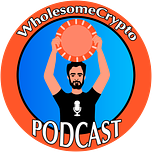



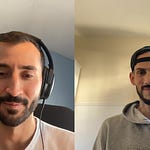



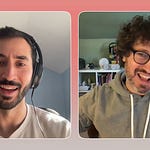

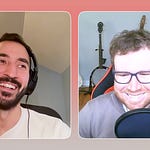

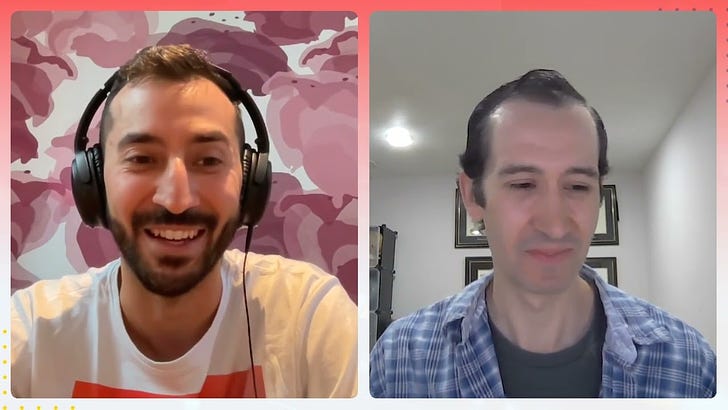
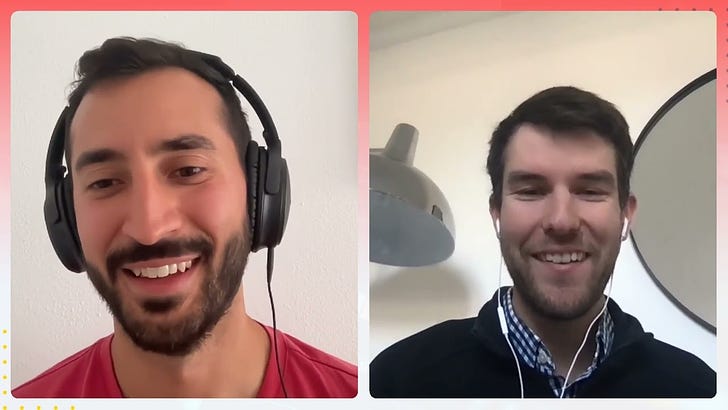
Hudson Jameson - Ops at Flashbots, Co-Founder of ETH Cat Herders, Tabletop RPG podcaster